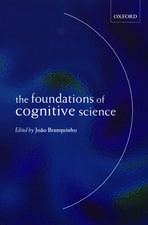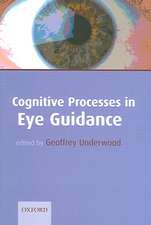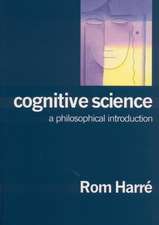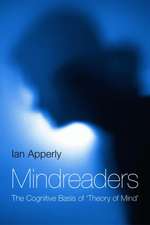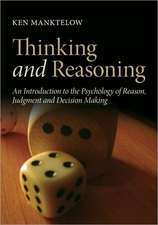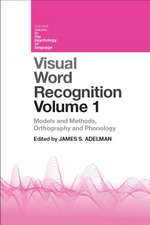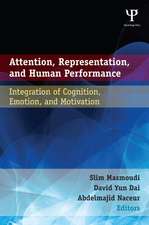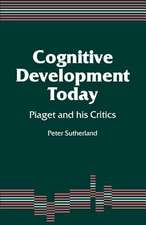Creativity and Divergent Thinking: A Task-Specific Approach
Autor John Baeren Limba Engleză Hardback – aug 1993
Reviewing the available research on divergent thinking, this book presents a framework for understanding other major theories of creativity, including Mednick's associative theory and a possible connectionist approach of creativity. It reports a series of studies (including the study that won APA's 1992 Berlyne Prize) that demonstrate the absence of effects of general creative-thinking skills across a range of creativity-relevant tasks, but indicate that training in divergent thinking does in fact improve creative performance across diverse task domains. The book then ties these findings together with a multi-level theory, in which a task-specific approach to creativity is strengthened by recasting some divergent-thinking concepts into domain- and task-specific forms.
This book fills the gap between divergent-thinking theory and more recent, modular conceptions of creativity. Rather than advocate that we simply discard divergent thinking -- an approach that hasn't worked, or at least hasn't happened, because of many attacks on its validity and usefulness -- this book shows how to separate what is useful in divergent-thinking theory and practice from what is not. It shows that divergent-thinking training can be valuable, although often not for the reasons trainers think it works. And it offers specific suggestions about the kinds of creativity research most needed today.
| Toate formatele și edițiile | Preț | Express |
|---|---|---|
| Paperback (1) | 436.14 lei 6-8 săpt. | |
| Taylor & Francis – 29 feb 2016 | 436.14 lei 6-8 săpt. | |
| Hardback (1) | 995.54 lei 6-8 săpt. | |
| Taylor & Francis – aug 1993 | 995.54 lei 6-8 săpt. |
Preț: 995.54 lei
Preț vechi: 1214.07 lei
-18% Nou
Puncte Express: 1493
Preț estimativ în valută:
190.55€ • 198.18$ • 159.68£
190.55€ • 198.18$ • 159.68£
Carte tipărită la comandă
Livrare economică 13-27 martie
Preluare comenzi: 021 569.72.76
Specificații
ISBN-13: 9780805812954
ISBN-10: 0805812954
Pagini: 136
Dimensiuni: 152 x 229 x 13 mm
Greutate: 0.35 kg
Ediția:1
Editura: Taylor & Francis
Colecția Psychology Press
Locul publicării:Oxford, United Kingdom
ISBN-10: 0805812954
Pagini: 136
Dimensiuni: 152 x 229 x 13 mm
Greutate: 0.35 kg
Ediția:1
Editura: Taylor & Francis
Colecția Psychology Press
Locul publicării:Oxford, United Kingdom
Public țintă
ProfessionalCuprins
Contents: Preface. Introduction. Theories of Creativity. Empirical Evidence for the Divergent-Thinking Theory of Creativity. Research on the Generality of Creative Performance Across Task Domains. Evaluations of the Effects of Training in Divergent Thinking on Creative Performance. Conclusions.
Recenzii
"...[the author] has offered a new and potentially profitable direction for studying one of psychology's most significant, but elusive, topics."
—Contemporary Psychology
"Baer's book has what monographs in the social and behavioral sciences are supposed to have, namely a clear and progressive message which is supported by sound empirical research. Baer's primary message about a specificity of thinking takes us an important step closer to understanding the creative process. His research involves real creative products, not just solutions to hypothetical problems. At least as important is that these creations are the products of students of various ages. This makes for clear implications in the classroom. This book really has a great deal in its favor, and educators and cognitive scientists alike will find it of interest and value."
—Mark A. Runco
California State University, Fullerton, Editor, Creativity Research Journal</</i>
—Contemporary Psychology
"Baer's book has what monographs in the social and behavioral sciences are supposed to have, namely a clear and progressive message which is supported by sound empirical research. Baer's primary message about a specificity of thinking takes us an important step closer to understanding the creative process. His research involves real creative products, not just solutions to hypothetical problems. At least as important is that these creations are the products of students of various ages. This makes for clear implications in the classroom. This book really has a great deal in its favor, and educators and cognitive scientists alike will find it of interest and value."
—Mark A. Runco
California State University, Fullerton, Editor, Creativity Research Journal</</i>


